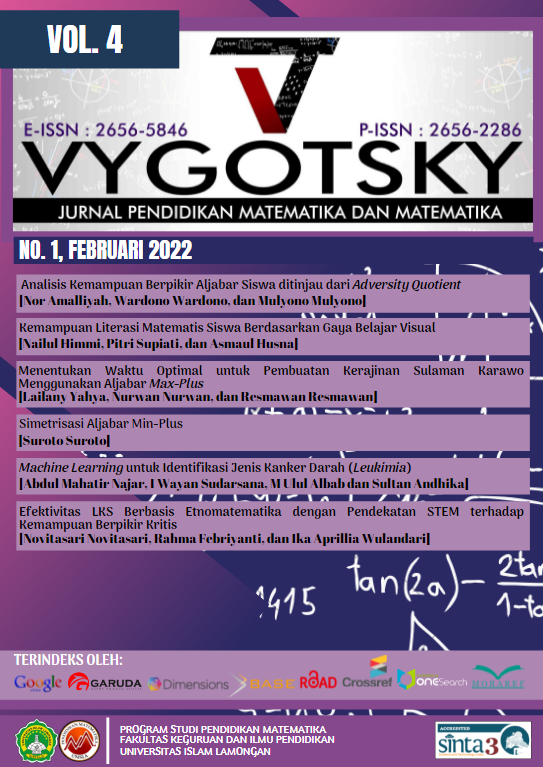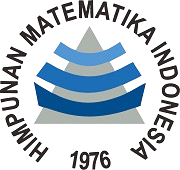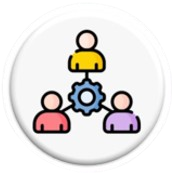Efektivitas LKS Berbasis Etnomatematika dengan Pendekatan STEM terhadap Kemampuan Berpikir Kritis
DOI:
https://doi.org/10.30736/voj.v4i1.521Keywords:
Berpikir Kritis, Efektivitas, Etnomatematika, LKS, STEMAbstract
Penelitian lebih lanjut terkait LKS yang telah dikembangkan dilakukan dalam upaya melihat keefektifan LKS untuk meningkatkan kemampuan berpikir kritis siswa. Penelitian yang melibatkan siswa kelas IX sebagai subjek penelitian kelas kontrol maupun eksperimen ini merupakan penelitian quasi-experimental. Berdasarkan uji ANCOVA (Analysis of Covariance) dan regresi, penggunaan LKS berbasis etnomatematika dengan pendekatan STEM memiliki perbandingan hasil Critical Thinking Ability Test (CTAT) yang lebih tinggi daripada pembelajaran tanpa menggunakan LKS berbasis etnomatematika dengan pendekatan STEM. Sehingga, simpulan yang diperoleh adalah penggunaan LKS berbasis etnomatematika dengan pendekatan STEM efektif untuk meningkatkan kemampuan berpikir kritis siswa.Downloads
References
Barakabitze, A. A., William-Andey Lazaro, A., Ainea, N., Mkwizu, M. H., Maziku, H., Matofali, A. X., Iddi, A., & Sanga, C. (2019). Transforming African Education Systems in Science, Technology, Engineering, and Mathematics (STEM) Using ICTs: Challenges and Opportunities. Education Research International, 2019. https://doi.org/10.1155/2019/6946809
D’Ambrosio, U., & Rosa, M. (2017). Ethnomathematics and Its Pedagogical Action in Mathematics Education. https://doi.org/10.1007/978-3-319-59220-6_1
Facione, P. a. (2011). Critical Thinking : What It Is and Why It Counts. Insight Assessment, ISBN 13: 978-1-891557-07-1., 1–28. https://www.insightassessment.com/CT-Resources/Teaching-For-and-About-Critical-Thinking/Critical-Thinking-What-It-Is-and-Why-It-Counts/Critical-Thinking-What-It-Is-and-Why-It-Counts-PDF
Hartini, S., Mariani, I., Misbah, & Sulaeman, N. F. (2020). Developing of students worksheets through STEM approach to train critical thinking skills. Journal of Physics: Conference Series, 1567(4). https://doi.org/10.1088/1742-6596/1567/4/042029
Kang, N.-H. (2019). A review of the effect of integrated STEM or STEAM (science, technology, engineering, arts, and mathematics) education in South Korea. Asia-Pacific Science Education, 5(1). https://doi.org/10.1186/s41029-019-0034-y
Makhmudah, S., Suyitno, H., & Rusilowati, A. (2021). Mathematics Critical Thinking Ability Reviewing from Gender and Independent Learning Students in Stem Problem-Based Learning Assisted by Web E Learning School. 10(2), 211–219.
Novitasari, N., Prafianti, R. A., Maulidaturrohmah, S., & Rizqi, M. I. (2020). Students’ Worksheet Validity Based on Ethnomathematics with STEM Approach for Junior High School Student-Proceedings of The 7 th International Conference on Research, Implementation and Education of Mathematics and Sciences (7 th Icriems). FMIPA Universitas Negeri Yogyakarta. http://seminar.uny.ac.id/icriems/sites/seminar.uny.ac.id.icriems/files/Proceeding2020/Proceeding Mathematics education.pdf
Prasadi, A. H., Wiyanto, W., & Suharini, E. (2020). The Implementation of Student Worksheet Based on STEM (Science, Technology, Engineering, Mathematics) and Local Wisdom to Improve of Critical Thinking Ability of Fourth Grade Students. Journal of Primary Education, 9(3), 227–237. https://doi.org/10.15294/jpe.v9i3.37712
Priatna, N., Lorenzia, S. A., & Widodo, S. A. (2020). STEM education at junior high school mathematics course for improving the mathematical critical thinking skills. Journal for the Education of Gifted Young Scientists, 8(3), 1173–1184. https://doi.org/10.17478/JEGYS.728209
Richardo, R., Martyanti, A., & Suhartini. (2019). Developing ethnomathematical tasks in the context of yogyakarta to measure critical thinking ability. Journal of Physics: Conference Series, 1188(1). https://doi.org/10.1088/1742-6596/1188/1/012063
Rosa, M., & Orey, D. C. (2018). STEM Education in the Brazilian Context: An Ethnomathematical Perspective. 221–247. https://doi.org/10.1007/978-981-10-5448-8_11
Saputra, H. (2020). Kemampuan Berfikir Kritis Matematis. Perpustakaan IAI Agus Salim, 2(April), 1–7.
Sari, A. N., Wahyuni, R., & Rosmaiyadi, R. (2016). Penerapan Pendekatan Open-Ended untuk Meningkatkan Kemampuan Berpikir Kritis Siswa Pada Materi Aljabar Kelas VIII SMP Negeri 10 Pemangkat. JPMI (Jurnal Pendidikan Matematika Indonesia), 1(1), 20. https://doi.org/10.26737/jpmi.v1i1.78
Siswono, T. Y. E., Hartono, S., & Kohar, A. W. (2018). Effectiveness of project based learning in statistics for lower secondary schools. Egitim Arastirmalari - Eurasian Journal of Educational Research, 2018(75), 197–212. https://doi.org/10.14689/ejer.2018.75.11
Suherman, Vidákovich, T., & Komarudin. (2021). STEM-E: Fostering mathematical creative thinking ability in the 21st Century. Journal of Physics: Conference Series, 1882(1). https://doi.org/10.1088/1742-6596/1882/1/012164
Yulianti, D., Wiyanto, Rusilowati, A., & Nugroho, S. E. (2020). Student worksheets based on Science, Technology, Engineering and Mathematics (STEM) to facilitate the development of critical and creative thinking skills. Journal of Physics: Conference Series, 1567(2). https://doi.org/10.1088/1742-6596/1567/2/022068
Downloads
Published
How to Cite
Issue
Section
License
Copyright:
Authors who publish their manuscripts in this Journal agree to the following conditions:
- Copyright of any article on Vygotsky: Jurnal Pendidikan Matematika dan Matematika is held solely by the author under the Creative Commons Attribution 4.0 International license (CC BY NC SA).
- Authors can submit papers separately, arrange non-exclusive distribution of manuscripts that have been published in this journal into other versions (e.g. sending to the author's institutional repository, publication in a book, etc.) by acknowledging that the manuscript has been published for the first time in Vygotsky: Jurnal Pendidikan Matematika dan Matematika.
License:
Vygotsky: Jurnal Pendidikan Matematika dan Matematika is published under the terms of the Creative Commons Attribution 4.0 International License (CC BY NC SA). This license permits anyone to copy and redistribute this material in any form or format, compile, modify and develop this material for any purpose as long as it is not for commercial purposes. Additionally, anyone must provide credit and distribute contributions under the license of the creator of the original work.







